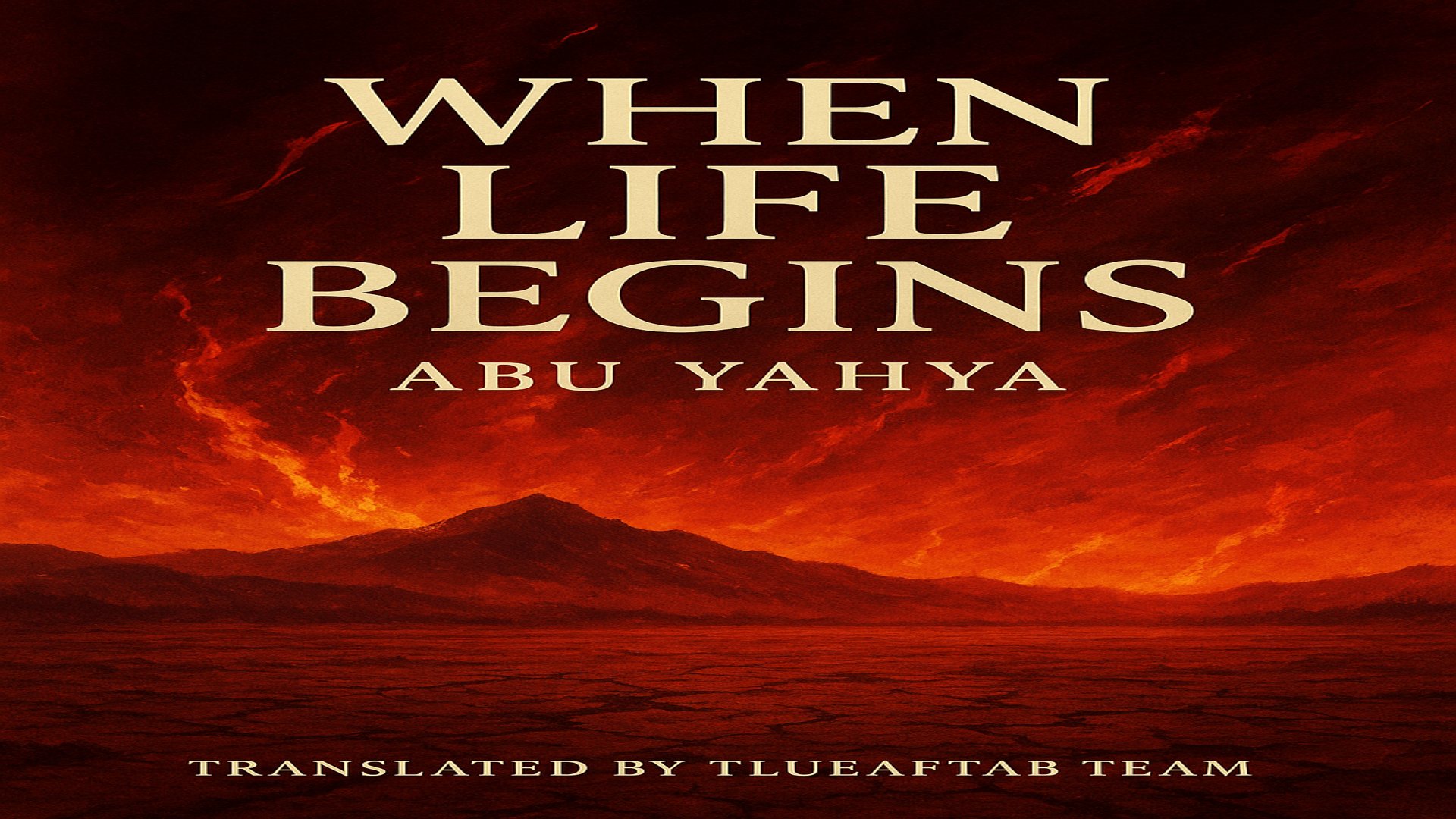Abu Yahya
Translated by Tlueaftab Team
The Companions of the Prophet ﷺ, the Muhajirun and the Ansar, sat in a respectful circle. A great multitude of the earliest and latest of the Ummah of Muhammad ﷺ was also present. Among these devoted moths of the candle of Prophethood sat the Messenger of Allah ﷺ, his head bowed. Outwardly, everything seemed in order, yet I could sense the same kind of unease and reflection here that I had witnessed earlier.
The Messenger of Allah ﷺ was at that moment engrossed in supplication before the Lord of Majesty. “We should sit and wait,” Saleh said as he moved towards the rear rows. We took our places at the back. From here, it was difficult to see what was happening ahead.
I asked Saleh, “When will the reckoning begin?”
“How would I know? No one knows,” he replied.
Hearing this, I fell silent, leaned my head against the back of the seat, and closed my eyes. I do not know how much time had passed when Saleh’s voice startled me:
“Abdullah, stand up! See who has come to meet you.”
I quickly rose, and before me stood a dignified and majestic personality. A smile adorned his face, and love radiated from his eyes. Before Saleh could say anything further, the noble man introduced himself in a gentle tone:
“Welcome, Abdullah! My name is Abu Bakr. On behalf of the Messenger of Allah ﷺ, I welcome you.”
As he said this, he extended his arms. Overwhelmed with emotion, I embraced him. After the embrace, he led me aside to a seat a little away from the people.
No sooner had I sat than I asked, “When will I be able to meet the Messenger of Allah ﷺ?”
He replied, “The Messenger of Allah ﷺ is presently engaged in gratitude and supplication before the Almighty. You may meet him later. For now, there is something important to tell you: the supplication of the Messenger has been accepted in the Divine Court — that the reckoning should commence. At that very moment of acceptance, you too had made a supplication — to be allowed to return to the plain of resurrection and witness its scenes again. That request has also been granted. The reckoning will begin shortly, but until then you may observe the conditions of the people. The Messenger of Allah ﷺ has sent me with this message for you.”
Joy lit up my face, and a smile appeared on the face of the Caliph of the Messenger ﷺ as well. After a pause, he spoke again:
“Outside, the conditions are severe. Though Saleh will be with you, still, drink this.”
He handed me a shining golden goblet.
“This drink will protect you from the torments outside.”
I took the goblet with both hands and raised it to my lips. The moment it touched them, an extraordinary sensation overcame me. Though I was neither thirsty nor restless, the satisfaction I felt was beyond anything imaginable. Perhaps even a man dying of thirst for centuries could not feel such relief upon his first sip of water. Each drop that passed from my lips to my throat, from my throat to my chest, and from my chest to my stomach, filled every vein of my body with coolness, sweetness, and bliss. My heart longed to drink it all in one gulp, but out of reverence for the noble presence before me, I restrained myself.
Softly I asked, “What is this?”
“This is your first introduction to the new life and the new world. This is the Goblet of Kawthar. After drinking this, neither the heat of the Resurrection nor its thirst will afflict you.”
At these words, I understood why this drink had produced such extraordinary effects in me. This was the water of Kawthar — the heavenly stream — of which I had always heard. In that instant, I realized what the delights of Paradise would be like.
In the previous world, the pleasure of food and drink depended on two things: first, intense hunger or thirst, and second, the availability of something delicious. But the provisions of Paradise are inherently exquisite, and they provide the same joy and satisfaction even without hunger or thirst. One may eat and drink endlessly, without satiety ever becoming heaviness.
Once again, Saleh and I moved swiftly forward.
As soon as we crossed the boundary of the Throne, we were confronted by an environment of unbearable heat and suffocating humidity. It seemed as if the sun had drawn nearer by millions of miles. The air was still; people were drenched in sweat, yet no sign of water was anywhere.
The effect of the Goblet of Kawthar shielded me, otherwise survival here would have been impossible. But countless others roamed, ruined and desperate — their faces pale, eyes haunted with terror, hair matted with dust, bodies soaked in sweat and dirt, feet blistered and bleeding.
Never in my life had I seen such horror. Chaos reigned everywhere. Everyone cared only for themselves.
My eyes searched for someone familiar. The first person I recognized was my own teacher, Farhan Ahmad. He caught sight of me from afar and quickly tried to avoid me.
“Stop him!” I said to Saleh. “He is my teacher. I want to speak to him.”
But Saleh stopped me and said regretfully, “Do not add to your teacher’s humiliation. Whoever is disgraced here is so because justice has been served. He was found false upon the Divine scales.”
I cried out, “But it was he who taught us about God, the Hereafter, and morality!”
“Perhaps he taught,” Saleh replied indifferently, “but his knowledge never became his character. Remember! Before God, a man is not judged by his knowledge but by his deeds, his character, his very self. Knowledge exists to build the person. If the building collapses, then knowledge becomes no more than a serpent. If knowledge touches only the tongue, it is poison; but if it penetrates the heart, it becomes a friend. That is what happened to your teacher. He wrote well, he spoke well, but his life did not match his words. Today, the very serpents of his knowledge have devoured him.”
I was shaken. My teacher — who had been like a father to me, who had guided me, supported me, even arranged my marriage — was now disgraced. My heart broke. I stood silently, unable to absorb it.
Around me, people wailed, screamed, cursed, and fought. Some struck their heads against stones, some covered their faces in shame, some wept and lamented, some blamed their parents, spouses, friends, or leaders for their ruin.
And yet — nothing could change. Time for preparation had ended. Now there was only waiting. Waiting for the appearance of the Sovereign of the Universe, before whom the reckoning would begin and justice would be established.
Amid this horror, Saleh suddenly said, “Abdullah, know this: among your family, your daughter Laila and your son Jamshed are also here in this same wretched condition.”
The ground beneath my feet seemed to vanish. I collapsed in shock, covering my head with my hands as tears streamed down my face. But here, no one cared for another. Every soul was consumed with their own fate. People passed by us with indifference.
After a long while, I asked, “What will happen now?”
“Obviously, the reckoning will begin,” Saleh replied plainly. “Those who lived in the world for this Day, who fulfilled the demands of faith and morality, or who devoted themselves to the cause of God’s religion — they have already been raised in safety. Their death itself became their certificate of salvation. Now, they are beneath the shade of the Throne. For them, only a formal reckoning remains, after which their success will be declared.”
“But what of sins? Did they never sin?” I asked.
“They too sinned,” Saleh explained. “But their minor sins were erased by their good deeds, and whenever they stumbled into a major sin, they immediately cleansed it with tears of repentance. Such purified souls are already safe.
But those whose records bear crimes that nullify faith — disbelief, hypocrisy, murder, adultery, oppression, consuming the wealth of orphans, trampling upon the limits of Allah — the scale of justice will weigh heavy against them. They will be condemned to Hell.”
“And what of those between these two extremes?” I pressed.
Saleh nodded. “Yes, there are such people. They possess faith and some good deeds, but they lived in sin without repentance. Such people will suffer the terrors of the Resurrection, until at last, perhaps, salvation may come.
Those you see here today are either outright criminals destined for Hell, or believers stained with sin. Their humiliation will match the weight of their sins. Those with fewer sins may be granted relief once the reckoning begins. But even then, the ordeal of this Day is enough to erase the intoxication of worldly pleasures.
As for those with greater sins, they may endure thousands, even millions of years of torment here.”
I reflected deeply. In the world, sins had seemed so trivial. Yet today, each one had turned into unbearable misery. If only people had never taken sins lightly, if only repentance had been their habit! If only they had avoided backbiting, slander, wastefulness, ostentation, and the violation of rights!
After a pause, I asked, “Does anyone know now whether they will be saved or not?”
“That is the greatest agony,” Saleh answered. “No one knows their fate — except Allah. That is why the Messenger of Allah ﷺ and other prophets kept supplicating for the reckoning to begin, so that the believers may finally be separated from the criminals and attain salvation.
The good news is, the Messenger’s prayer has been accepted. Even Abu Bakr al-Siddiq himself conveyed this to you. But as for when Allah will command the reckoning to commence — that rests upon His wisdom. Perhaps not all people have yet arrived from their graves.”
“What do you mean? After all this time, people have still not reached here?” I asked in amazement.
Saleh replied, “Do you think people arrive here by planes, trains, or buses? No! They are all driven on foot, forced by the blast of Israfil’s trumpet. Seas have been dried, mountains leveled, and all paths lead here. But it takes time. Only the righteous, escorted by angels, were brought here swiftly.
Until the reckoning begins, let us observe the conditions of those present. Perhaps that is why you wished to return here.”
With those words, he took my hand again and led me forward…
✍🏻📜☜ To be continued…




